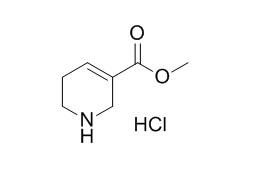Norarecoline Hydrochloride
Norarecoline is a muscarinic agonist.
Inquire / Order:
manager@chemfaces.com
Technical Inquiries:
service@chemfaces.com
Tel:
+86-27-84237783
Fax:
+86-27-84254680
Address:
1 Building, No. 83, CheCheng Rd., Wuhan Economic and Technological Development Zone, Wuhan, Hubei 430056, PRC
Providing storage is as stated on the product vial and the vial is kept tightly sealed, the product can be stored for up to
24 months(2-8C).
Wherever possible, you should prepare and use solutions on the same day. However, if you need to make up stock solutions in advance, we recommend that you store the solution as aliquots in tightly sealed vials at -20C. Generally, these will be useable for up to two weeks. Before use, and prior to opening the vial we recommend that you allow your product to equilibrate to room temperature for at least 1 hour.
Need more advice on solubility, usage and handling? Please email to: service@chemfaces.com
The packaging of the product may have turned upside down during transportation, resulting in the natural compounds adhering to the neck or cap of the vial. take the vial out of its packaging and gently shake to let the compounds fall to the bottom of the vial. for liquid products, centrifuge at 200-500 RPM to gather the liquid at the bottom of the vial. try to avoid loss or contamination during handling.
J Pharm Biomed Anal.2019, 164:119-127
ACS Omega2020, 5,33,20825-20830
Viruses.2024, 16(7):1128.
J Clin Med.2019, 8(10):E1664
Journal of Food and Drug Analysis2023, 31(3), 9.
Kasetsart University2022, ethesis.1144.
Molecules.2018, 23(7):E1659
Pharmaceuticals (Basel).2021, 14(6):588.
Nat Commun.2019, 10(1):2745
Phytomedicine.2019, 55:229-237
Related and Featured Products
Arzneimittelforschung. 1989 May;39(5):539-44.
Synthesis and muscarinic activity of a series of tertiary and quaternary N-substituted guvacine esters structurally related to arecoline and arecaidine propargyl ester.[Pubmed:
2757669]
A series of tertiary and quaternary N-substituted guvacine (1,2,5,6-tetrahydro-3-carboxy-pyridine) methyl and propargyl esters have been synthesized and tested for muscarinic/antimuscarinic activity on rat ileum and electrically paced left atria.
METHODS AND RESULTS:
Arecoline and arecaidine propargyl ester (APE) as well as their corresponding N-demethyl derivatives, guvacoline (norarecoline,
Norarecoline Hydrochloride) and guvacine propargyl ester, acted as full agonists at both atrial and ileal muscarinic receptors (range of pD2-values 6.09-8.07). However, in both preparations arecoline and APE were clearly more potent (up to 15-fold) than their N-demethyl analogues. Replacement of the N-methyl group in arecoline and APE by larger substituents (ethyl, n-propyl, n-butyl, benzyl, phenylethyl) as well as N-methylation resulted in a decrease or even a complete loss of agonistic activity. In both organs, the propargyl esters usually showed higher potency than the corresponding methyl ester analogues.
CONCLUSIONS:
N-Ethylguvacine propargyl ester and APE methiodide displayed pronounced agonistic activity in the atria (pD2 approximately 6.5; intrinsic activity = 0.79 and 0.67, respectively) but behaved as competitive antagonists in the ileum (pA2 = 6.06 and 5.62, respectively). Beside the lower sensitivity to muscarinic agonists of the rat ileum as compared to rat atria, the cardioselective stimulant action of both agents may also be due to their ability to recognize structural differences between atrial M2 alpha and ileal M2 beta muscarinic receptor subtypes.
Drug Des Discov. 1993;9(3-4):237-50.
Conformational aspects of the muscarinic receptor interactions of bicyclic isoxazole ester bioisosteres of arecoline.[Pubmed:
8400005]
METHODS AND RESULTS:
3-Methoxy-4,5,6,7-tetrahydroisoxazolo [4,5-c]pyridine (O-Me-THPO) and O,5-di-Me-THPO are conformationally restricted bioisosteres of the muscarinic agonists norarecoline(Norarecoline Hydrochloride )
and arecoline, respectively, showing partial agonist effects at muscarinic acetylcholine receptors. The 7-membered ring analogue of O-Me-THPO, 3-methoxy-5,6,7,8-tetrahydro-4H-isoxazolo[4,5-c]azepine (O-Me-THAO), shows higher affinity for muscarinic receptor sites than O-Me-THPO or O,5-di-Me-THPO. Similarly, O-Et-THAO binds much more tightly to muscarinic receptor sites than its 6-membered ring analogues, O-Et-THPO and O-Et-5-Me-THPO. Based on receptor binding data, O-Me-THPO and O-Me-THAO, and O-Et-THPO and O-Et-THAO, respectively, show similar degrees of partial agonism. They also show similar relative affinities for muscarinic M1 and M2 receptor sites. Using the semiempirical quantum mechanics programme, AM1, and the molecular mechanics programme, SYBYL, we have studied the conformational flexibility of the O-alkyl-THPO and O-alkyl-THAO ring systems.
CONCLUSIONS:
As expected, the 7-membered ring of the latter system was shown to be markedly more flexible than the piperidine rings of O-alkyl-THPO analogues. On the basis of this analysis, a common pharmacophore for these two classes of compounds was constructed.



